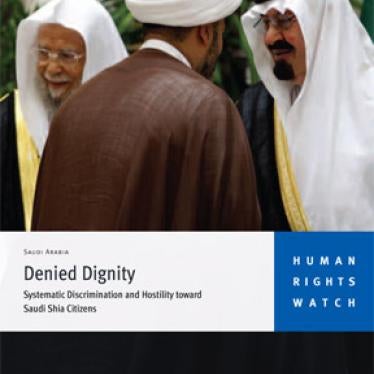(New York) - Saudi authorities should treat minority Shia Muslims as equal citizens, Human Rights Watch said in a report released today. The Saudi government also should create commissions to investigate arbitrary arrests of Shia and to recommend steps to end systemic state discrimination, Human Rights Watch said. The Shia are estimated to constitute between 10 and 15 percent of the Saudi population.
The 32-page report, "Denied Dignity: Systematic Discrimination and Hostility toward Saudi Shia Citizens," documents the sharpest sectarian tensions in the kingdom in years, set off by clashes between Shia pilgrims and religious police in Medina in February 2009, followed by arbitrary arrests of Shia protesters in the Eastern Province in March. The closing of private Shia halls for communal prayer in Khobar, which began in July 2008 and the arrests of Shia religious and community leaders in Ahsa' in 2009 also have contributed to the tensions.
"All the Saudi Shia want is for their government to respect their identity and treat them equally," said Sarah Leah Whitson, Middle East and North Africa director at Human Rights Watch. "Yet Saudi authorities routinely treat these people with scorn and suspicion."
The government should also establish a commission to explore the sharing of holy places among Muslims of differing creeds, especially in Mekka and Medina, Human Rights Watch said. King Abdullah has made some moves toward religious tolerance, but the discrimination by state institutions has not ended.
Between February 20 and 24, 2009, Shia pilgrims from the heavily Shia Eastern Province who had come to Medina for the anniversary of the prophet Muhammad's death clashed with Sunni religious police at the Baqi' cemetery over doctrinal differences concerning the rituals surrounding commemoration of the dead. Security forces shot a 15-year-old pilgrim in the chest, and an unknown civilian stabbed a Shia religious sheikh in the back with a knife, shouting "Kill the rejectionist [Shia]." The authorities denied that anyone had been wounded, and played down the ensuing arrests of Shia pilgrims. On March 5, however, King Abdullah ordered all of the Medina detainees released.
In late February and March, Shia in the Eastern Province towns of Qatif and Safwa demonstrated to show solidarity with detainees from the Medina clashes. Shia also protested in ‘Awwamiyya to demand equal treatment following a sermon in which a Shia preacher, Nimr al-Nimr, had said, "Our dignity is more precious than the unity" of the kingdom. Security forces reacted by arresting scores of demonstrators, detaining many for months.
In May, June, and July, the police, reportedly on instructions from the Eastern Province governorate, arrested Shia in Khobar, ordering them to close private halls for communal prayers. One such Shia, Abdullah Muhanna, was held from May 25 until July 1. There are no Shia mosques in Khobar, though state-funded Sunni mosques abound.
In Ahsa', in southern Eastern Province, authorities arrested at least 20 Shia between January and July for their religious or cultural practices, such as Shia women's Quran studies or selling special clothing for ceremonies. Those arrested were held under extrajudicial sentences for periods ranging from a week to a month. Such religiously motivated arrests in Ahsa' date back to at least 2001.
State discrimination against Shia extends to realms other than religious freedom. The report cites discrimination in the education system, where Shia may not teach religion in class and Shia pupils learn from Sunni teachers that they are unbelievers. It also cited bias in the judiciary, where Sunni judges sometimes disqualify Shia witnesses on the basis of their religion and exclusively follow tenets of Sunni religious law. Shia are not allowed to become judges in ordinary courts.
This exclusion extends to employment as well. There are no Shia government ministers, senior diplomats, or high-ranking military officers. Shia students generally cannot gain admission to military academies.
In 2003, then-Crown Prince Abdullah initiated the National Dialogues initiative, which in its first meeting brought senior Sunni and Shia clerics together for the first time. In 2008, Abdullah, now king, renewed his attention to religious tolerance, first by bringing Shia and Sunnis together in Mekka in June, and then by calling for tolerance between religions, in speeches in Madrid and New York in July and October of that year. However, Saudi Arabia has made no progress toward religious tolerance domestically.
"The Saudi government has long regarded its Shia citizens through the prism of Wahhabi dogma or state stability, branding them as unbelievers or suspecting their national loyalties," said Whitson. "It is time for a new approach that treats Shia as citizens with equal rights."







